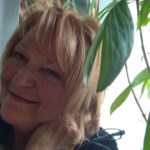Howling
“We don’t see things as they are, we see things as we are.” -Anais Nin
Why should I assume my next-door neighbor
sits in front of the TV when days pass
with no sighting of her? Why do I imagine
an emptiness of purpose behind sturdy brick?
Didn’t she struggle this winter as I did
with strings of silver lights to festoon a house,
yet hers, rented? And what of that burly son
who comes and goes, whose hair changes
color more than our seasons? What if he lightens
her silence on icy mornings? What about the
times I try to greet her during rare sightings
and she turns away, silent, only adding fuel
to my frustration? Why don’t I feel guilt, cursing
her for her rudeness? Who was I to spray water
from my son’s upstairs window, pummeling
her immaculate doggy, yapping as voluble by degrees
as she is soundless, whose yip annoys, whose name
is unknown to me but whose small body might be
the only touch she knows? Why do I feel loftier
because I believe my border collie behaves, only bays
at police sirens, trained to hush by a tap on the window,
and my no bark command, but listen, isn’t she the woman
I see at the White Castle carrying a newspaper inside
while I wait for coffee at the drive-thru? the same woman
who answered the door last week when I knocked
to complain (in a neighborly way) about her yellow
porch light flooding my bedroom, that sacred place
where I try each night to rest, to leave the noise and need
to say hello behind? Yes, she is the woman who stepped
back into the dark when the door opened, whispered,
but, I’m alone, alone, then closed the door.
6 thoughts on "Howling"
Leave a Reply
You must be logged in to post a comment.



Beautiful ending, pulls it all together
I really enjoyed this complex and full poem.
I feel this Shelda❤️
This one requires multi readings. But I know I’ll remember “emptiness of purpose behind sturdy brick” with no effort!
Shelda, you make the questions form sing! What a story the questions tell. Like having a response at the end.
I love the questioning in this poem – of assumptions made without really knowing the truth. We all do it! And that makes this poem so powerful! And the simple explanation of the woman at the end, her fear so palpable! Wonderful!